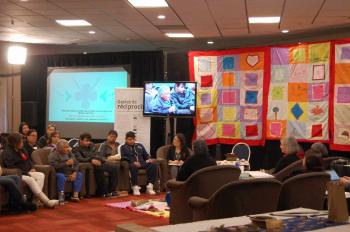Image Caption
Summary
By Shari Narine
Windspeaker.com Contributor
EDMONTON
Lane Francis was 21 years old when his sister Lori Lee Francis went missing. Just over 10 years later, Lane says he is staying strong to support his family as they tell Lori Lee’s story to the National Inquiry for Murdered and Missing Indigenous Women and Girls.
On Wednesday, Lane, the youngest of three Francis children, was accompanied by his brother Lance, grandmother Mary Francis, aunt Connie Francis and uncle Henry Francis in speaking about Lori Lee to Chief Commissioner Marion Buller. Buller heard how Lori Lee made her family laugh and loved to dance; how she raised her younger brothers; and how she was forced by the province to leave behind her baby daughter at birth.
Lori Lee went missing in October 2007 at the age of 23 from the Grande Prairie, Alta. area.
The Francis’ story held a theme expressed often throughout the three days the MMIWG national inquiry held community hearings in Edmonton. The family received little support from the RCMP, whether it was in reporting the disappearance of Lori Lee, in getting updates during the years that passed, lack of continuity in the investigation as the lead investigator changed at least four times, or in the simple request of replacing the photograph they were running of Lori Lee with another the family wanted to supply.
“When we reported her missing … they told us if we go out and look we’ll end up behind bars, too,” said Lane. “We weren’t allowed to go find my sister.”
Connie Francis said after getting the run around as to where to file the missing person report, whether in Grande Prairie, where Lori Lee was last seen, or in High Level, closest to Beaver First Nation, the family’s home, they finally went to the Grande Prairie RCMP detachment on Dec. 24, 2007. They were told to come back after Christmas. They filed the official report on Dec. 27.
“Can you imagine your Christmas, if that happened to you? What would you do? What would you do at that time?” said Connie.
“We shouldn’t have an issue of the police not doing what they’re supposed to be doing to find and help us in missing people. They should be there to solve the crime or whatever happened to them. It’s the way we’re treated and it hurts me a lot to see all these people (at the national inquiry) sitting around crying for someone that they lost,” said Henry Francis.
Connie said that she and Lori Lee’s mother, Vivian, spent the years that passed assuming the other was getting updates from the RCMP. It turned out neither was being provided with information on the investigation. And the one time Connie did get a phone call, she followed it up only to learn that the Grande Prairie RCMP had mixed up her niece’s file with another missing woman.
Vivian died last year without knowing what happened to her daughter.
“My mother still had hope. I do right now,” said Lane.
Henry also has hope. He said that in his travels on the road, he still drives around every community he comes to looking for Lori Lee.
The family was prompted through their storytelling by Lillian Lundrigan, legal counsel for the MMIWG inquiry. She spoke to family members on the telephone and met with them in person in September during the commission’s community visits in Edmonton.
“When we sit with the family like that and the sense of helping, the little help that we’re doing, it makes a difference. It’s heavy but … they take something back for themselves and that’s why we do it,” said Lundrigan, who has also worked with Indian residential school survivors.
Almost 50 families had registered for the three-day hearing, which wraps up Thursday, to speak publicly in one of two locations or to speak in private. Statement takers are also working with families.
“The volume is just so high, that we can’t accommodate everybody,” said Lundrigan.
At this point, she doesn’t know if there are plans for the commission to return to Edmonton or Alberta.

